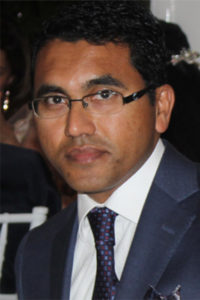
The United States sees an estimated 1.5 million new cases of pneumothorax and pleural effusion each year, and the incidence is expected to increase as the population ages. Unfortunately, despite seeing significant advances in research being translated into clinical guidelines during the past decade, many of these recommendations have not been put into practice by clinicians.
In an effort to further educate the profession about up-to-date, evidence-based strategies for the management of pneumothorax and malignant pleural effusions, an expert panel will convene Tuesday to discuss these complex cases and the management challenges they present.
This panel session, titled Advances in Management of Pneumothorax and Malignant Pleural Effusion, will start at 10:45 am in rooms 383-385 of the convention center. The expert, international faculty will include pulmonologists and a thoracic surgeon, a radiologist, and a pathologist.
Panel chair Rajesh Thomas, MBBS, PhD, who is a clinical senior lecturer of health and medical sciences at the University of Western Australia, said the discussion will focus on diagnostic and therapeutic advances in cystic lung diseases, pneumothorax, and malignant pleural effusions, including updates on novel biomarkers, state-of-the-art imaging, and on the role of surgery and indwelling pleural catheters.
“Management of pneumothorax and malignant pleural effusion is often complex and challenging for clinicians,” Dr. Thomas said. “Advances in pleural research have changed practice and informed new guidelines, but there is an urgent need to disseminate information about this patient-centered approach to clinicians who are not pleural subspecialists to allow them adopt it more widely in clinical practice.”
Dr. Thomas, who is a specialist at the Institute for Respiratory Health, one of Australia’s only research organizations dedicated specifically to investigating respiratory disease, said these advances in the management of pleural diseases, which are backed by multiple high-quality studies, have centered around using the latest imaging modalities, cytopathological techniques, and minimally invasive and less frequent pleural interventions such as indwelling pleural catheters. Combined with a patient-focused management strategy, this has reduced the need for major procedures such as surgery—thus reducing the associated complications, morbidity, hospitalization, and cost.
Following the panel discussion, Dr. Thomas said attendees should be able to choose the most appropriate diagnostic work-up and optimal management strategies for cystic lung diseases, pneumothorax, and malignant pleural effusion.
“Our expert panel includes world leaders who have directly led and participated in important clinical trials and guidelines committees in pleural diseases management,” he said. “The panel will review two complex clinical cases as part of a discussion of evidence-based approaches to managing recurrent pneumothorax, cystic lung disease, and malignant pleural effusions. The format will allow for audience participation and discussion of various practical management aspects, focusing on the novel diagnostic imaging and cytopathological techniques and the optimal therapeutic medical and surgical interventions.”
Dr. Thomas said data from relevant clinical trials on pneumothorax and malignant pleural effusions will be presented and discussed as part of the panel.
In addition to Dr. Thomas, the panel members are Y.C. Gary Lee, MBChB, PhD, FCCP, University of Western Australia; Nishant Gupta, MD, UC Health; Lonny Yarmus, DO, Johns Hopkins Medicine; Kazuhiro Yasufuku, MD, PhD, FCCP, University of Toronto; Kathryn Wikenheiser-Brokamp, MD, PhD, University of Cincinnati; Cris Meyer, MD, University of Wisconsin School of Medicine and Public Health; and Arash Badiei, MBBS, Royal Adelaide Hospital.
“Advances in pleural research have changed practice and informed new guidelines, but there is an urgent need to disseminate information about this patient-centered approach to clinicians who are not pleural subspecialists to allow them adopt it more widely in clinical practice.”
Rajesh Thomas, MBBS, PhD





